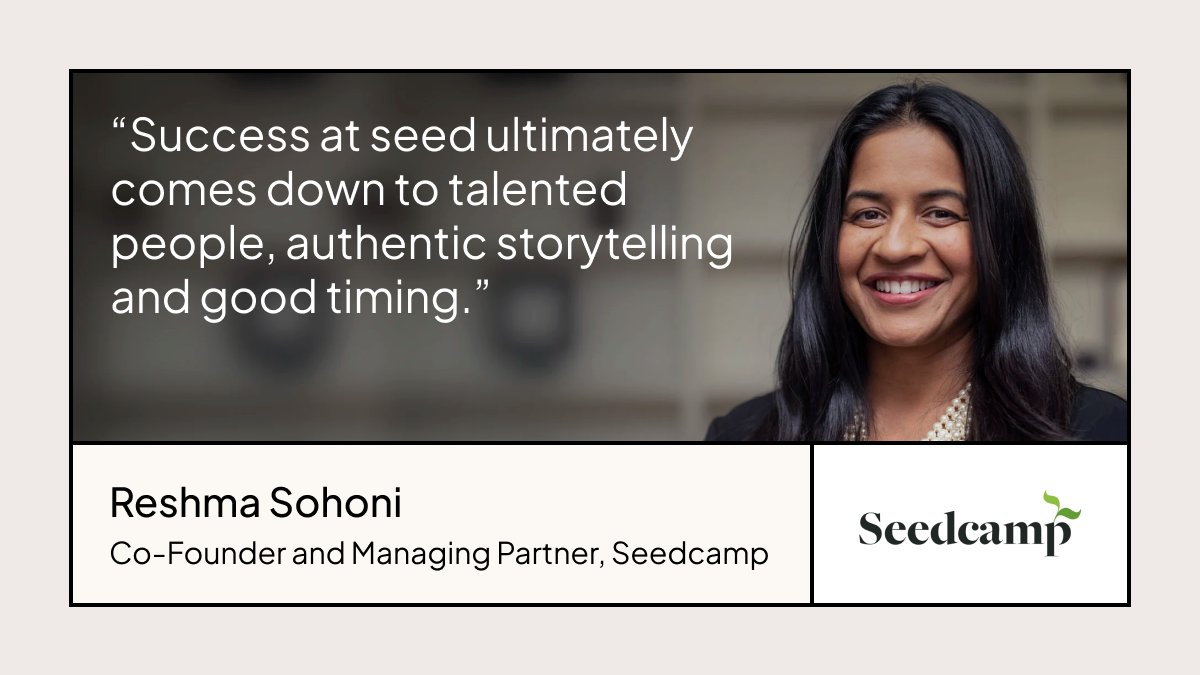Whether you’re a first-time founder or a seasoned entrepreneur, the seed round is the make-or-break moment in your startup’s growth journey. In today’s uncertain economic climate it may feel like a daunting prospect, but the seedscape remains full of potential.To give you a competitive advantage when it comes to fundraising, we asked one of Europe’s most prolific early-stage VCs to share her insights into the state of play in 2023. As co-founder and managing partner of Seedcamp, Reshma Sohoni has spent over 15 years growing a network of investors, founders, and experts, while building the infrastructure to support early-stage startups across Europe. She knows what it takes to succeed at seed.
Good is no longer good enough
“During the pandemic—when low-interest rates and free-flowing capital buoyed the market up—great companies looked exceptional, good companies looked great, and even the not-so-good ones seemed decent. This low-risk, high-return environment sent capital flooding into the market as investors tried to chase any potential upside.
“Since then, capital has become much more expensive and we’re dealing with an incredibly high-risk class of startups. The critical questions among investors today are, 'What are we risking our capital for?’ and ‘What kind of return will we see?’ This means companies need to be truly exceptional in order to stand out. Good startups that would have been snapped up a few years ago are having trouble raising funds in today’s climate.”
Bigger rounds mean higher stakes
“Seed funding has definitely reached a new level since we started Seedcamp in 2007. Back then, the average ticket size was between £500,000 and £1 million, possibly even £1.5 million. Now we see startups raising £1.5 million to £3 million at seed. You still get the odd £20 million seed round, but they’re less commonplace nowadays. The bar has been raised, so startups need to work harder to prove their value at this stage.”
The return of liquidation preferences
“An SVB report from May 2023 found that 41% of seed term sheets had some form of preferred shares. Liquidation preferences exist for a good reason: Venture capital is money at risk, so it needs to come with some level of governance. But this doesn’t necessarily mean that founders lose out.
“When the market was more buoyant, startups could set founder-friendly terms and there would still be someone willing to accept them. Now that capital is tighter, we seem to be returning to the pre-pandemic status quo; there’s a more even balance of power between the founding team and early investors. Most importantly, this balance is healthy for the company. Somewhere along the way, I think we forgot to focus on this entity sitting between the founders, the investors and the board. At the end of the day, the business is what we’re all invested in.”
Laying the foundations for sustainable growth
“I call pre-seed the ‘round of hopes and dreams.' A founder or founding team will come to us and say, ‘This is what I want to build. This is what excites me. There’s a problem in the market and I want to solve it.’ When companies get to Series A, they know something’s working so they typically want to put more fuel into the engine. Raising capital gives them the power they need to scale.
“Seed is probably the most challenging and precarious stage; you’re not a hope and a dream, and you don’t yet know what model of car you’re building or how long it’ll run for. It’s the point at which you need to start showing product-market fit, gain some traction, and prove you can hire brilliant talent while setting up a sustainable organization. That hasn’t changed since we started Seedcamp over a decade ago.”
Pitch more than your product
“At this stage, you probably haven’t built a recurring revenue model and you may not have a perfect product. What matters is your ability to articulate your thought process and tell your story through a well-presented deck. This helps me understand your qualities as a founder: Are you good at hiring incredible talent, or is storytelling and interacting with customers where you really excel?
“The next most important factor is the product—although I wouldn’t expect to see something already out in the market at this stage. Now that you’ve persuaded me you can tell your story and therefore attract customers and employees, I want to see how that vision translates from your head to a product someone might actually use. This is where rubber meets the road.
“In terms of red flags, infighting within the business is probably the biggest roadblock for turning a vision into reality. Things tend to fall apart when the founding team starts arguing over the mission, company culture, or hiring plan. Overconfidence can also be a bad sign. If a founder relies too heavily on their instincts without considering what’s around the corner, that’s when they can run into trouble.”
Seize your window of opportunity
“The success of your business depends on a variety of external factors, from market conditions to technology. If some of those factors fall into place at the right time, you’ll have a huge advantage in any industry. For instance, when Carta launched in 2013, a lot of legal and financial processes were starting to go digital. It arrived at the perfect moment, just as everything shifted from closed systems of communication and ownership towards collaborative, cloud-based systems.
“As a counter-example, we backed an AI assistant company a few years ago. Back then, Natural Learning Processing (NLP) models weren’t fully developed and there was a general lack of awareness in the mass market. But since ChatGPT became freely available online at the end of 2022, people have started to believe in AI-assisted tech because they’re able to use it on their own.
“Had that company been able to sustain itself for a few years until the right moment came along, it would have an edge in the market today. Talk about bad timing! That experience taught me that the window of opportunity matters—a lot.”
‘Why’ matters more than ‘how’
“Venture capital was always meant to serve a specific purpose: supporting high-risk companies and innovative technologies that, with patience and the right execution, can become paradigm-changing. As a founding team, you need to be able to articulate why you’re embarking on the venture capital journey and what differentiates you from other businesses. Is this really something that no one else can do? Figuring out your 'why' is around 80% of the work, and seed funding can help with the rest.”
The value of support networks at seed and beyond
“Seed can be a tough, lonely place to be as a small team—you need stamina and an incredible ability to process everything that’s going on. I recommend surrounding yourself with advisors and mentors who can offer the right support.
“The good news is that the pressure eases a bit once you get to the Series A part of the funnel. Running a business is never easy, but as your company grows you’ll have more people around you to share the burden with.
“Success at seed ultimately comes down to talented people, authentic storytelling and good timing. It’s the crucial stage of transforming your hopes and dreams into something that can scale.”
Seed funding cheat sheet
-
Research the landscape and consider what lies ahead to ensure you enter the market at the right time
-
Figure out your “why” before seeking investment—VCs won’t back you without a compelling story
-
Align your team on common objectives from day one—it’s harder to chase a dream you don’t agree on
-
Optimize your pitch deck to showcase your leadership qualities and thought process
-
Seek a balanced term sheet with upside for investors and founders—liquidation preferences may help you secure investment
-
Lean on your team and wider support network to reduce the pressure at seed

